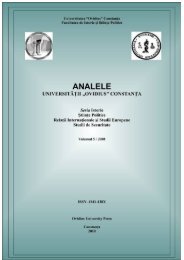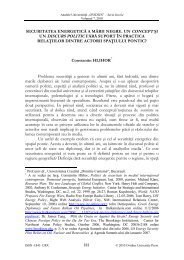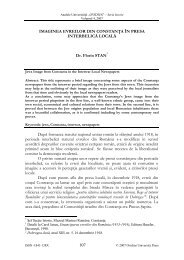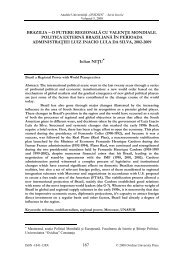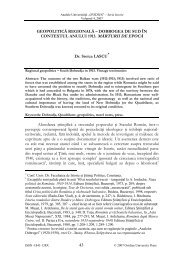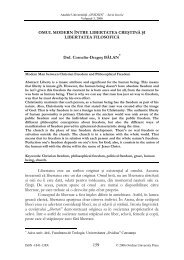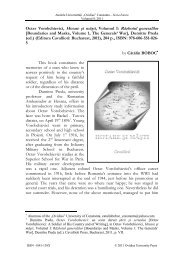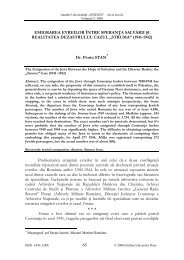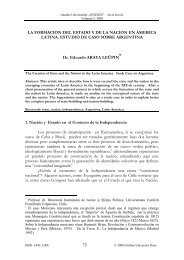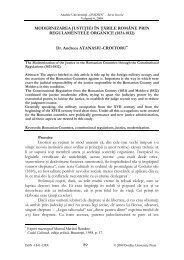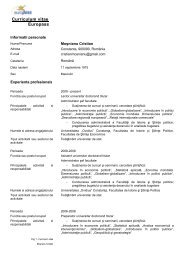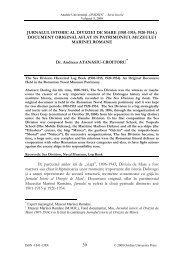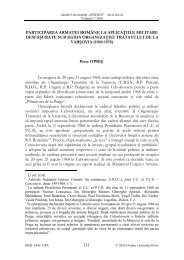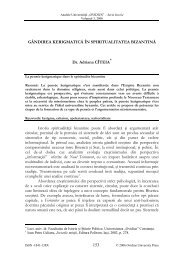analele universitÄÅ£ii âovidiusâ constanÅ£a - AUOCSI
analele universitÄÅ£ii âovidiusâ constanÅ£a - AUOCSI
analele universitÄÅ£ii âovidiusâ constanÅ£a - AUOCSI
You also want an ePaper? Increase the reach of your titles
YUMPU automatically turns print PDFs into web optimized ePapers that Google loves.
Marian Cojoc / Analele Universităţii „OVIDIUS” / Vol. 6/ 2009<br />
Committee of the Romanian Workers’ Party of the same day (annex…),<br />
concerning this important objective, at which elaboration had substantially<br />
contributed Gh. Gheorghiu-Dej, respecting the Kremlin’s suggestion: “The<br />
Political Office of the Central Committee of the Romanian Workers’ Party, in<br />
its meeting of May 25, current year – it was mentioned in document – taking<br />
note about the report of the comrade Gh. Gheorghiu-Dej regarding the project<br />
of building the Danube-Black Sea Canal and of economic and cultural<br />
developing of the surrounding region, considering that this great work is part of<br />
the project of building the socialism in our country, it decides that the project to<br />
be presented in front of the Council of Ministers for the immediate start of<br />
preparatory works of this canal’s construction” 2 .<br />
The imperative “suggestion” of Moscow regarded Romania still since<br />
1948, after one of the meetings between Dej and Stalin, on the field of the<br />
Soviet leader. The engineer Paul Sfetcu, Dej’s Head of Cabinet, was recently<br />
remembering the way in which it had been generated the decision regarding the<br />
construction of the Danube-Black Sea Canal: “After the nationalization of the<br />
main means of production, said Dej (in a discussion with his head of cabinet –<br />
our note), the state’s leaders analyzed the perspectives that would open the<br />
national economy in the new social-economic conditions. In order to establish<br />
the most appropriate measures, it was decided that a state and party delegation<br />
to go to Moscow, to discuss with the Soviet leaders for building an economic<br />
cooperation. We presented to the Soviet leaders the potential of our<br />
nationalized industry and the measures that we consider necessary for the fully<br />
revaluation of this potential and the ensuring of a continuous development<br />
regarding the Romanian-Soviet trade.<br />
Stalin, as if he had not heard what I said, asked: Does the leadership of<br />
Romania know something about a project made by the Englishmen, by the early<br />
20 th century, for the construction of a navigable canal between Danube and<br />
Black Sea<br />
I was stunned and in the same time frightened – it would said Dej after<br />
this – by the perspective that instead of an industrial development – our<br />
objective regarding the travel to Moscow – we will get “a hole in the ground” 3 .<br />
Seeing the hesitations of the Romanian delegation, “terrified by the<br />
unfortunate perspective which appeared”, Stalin appreciated that the Romanians<br />
will know to found the financial funds necessary for the work, ensuring the<br />
Romanian side that “the Soviet Union will supply to Romania the necessary<br />
2 Rezoluţii şi hotărâri ale CC al PMR [Resolutions and decisions of the Central Committee<br />
of the Romanian Workers’ Party], Bucharest, Editura P.M.R., 1951, p.111.<br />
3 Lavinia Betea, P. Sfetcu, Stalin decide: construiţi Canalul! [Stalin decides: build the<br />
Canal!], in “Magazin istoric” [Historic Magazine], year XXXI, no. 12(369)/December 1997,<br />
p. 13-14.<br />
ISSN -1841-138X 10 © 2009 Ovidius University Press



